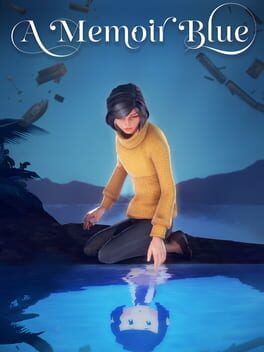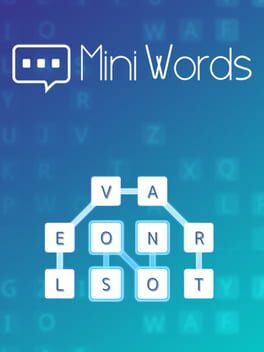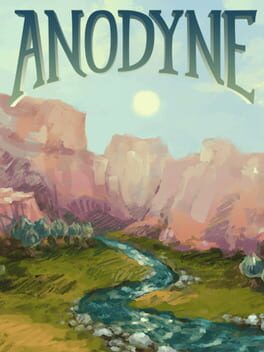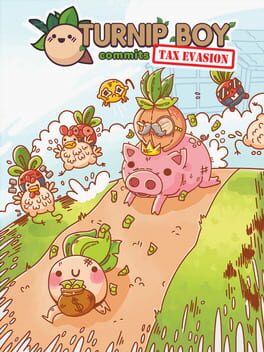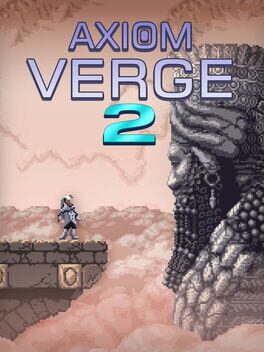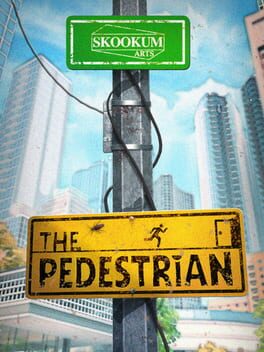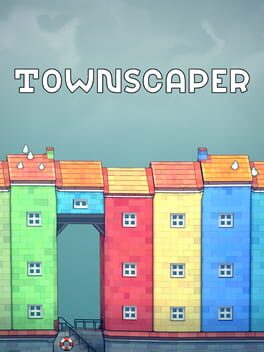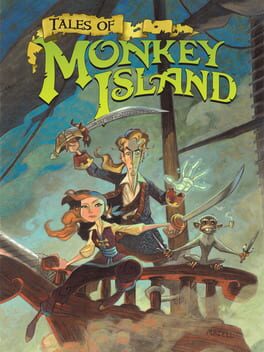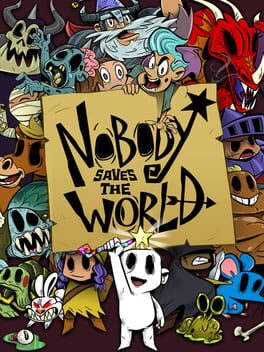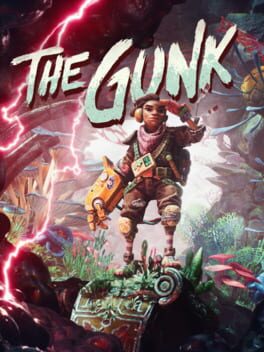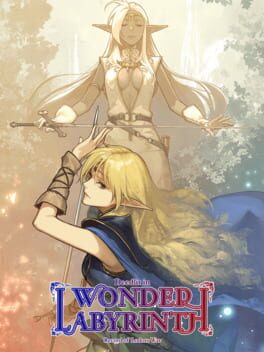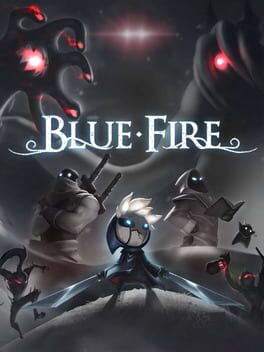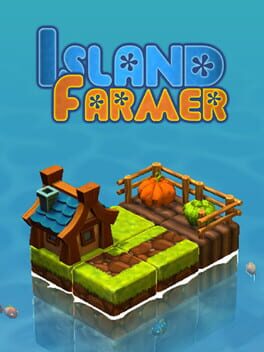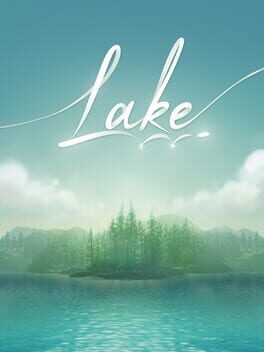Illusionary
2022
Completed with 100% of achievements unlocked. A Memoir Blue is a short, emotional point-and-click style narrative game recounting a young woman's memories of her mother. Very slow paced and with only minimal interactivity, it's a relaxing experience, albeit just ocassionally frustrating as you try to locate the interactive elements in a given scene - but ultimately I don't come away from the game feeling that it does anything particularly memorable. Still, it's a perfectly decent way to pass the hour or so's time that it takes to play to completion.
2019
All puzzles solved in "text only" mode, 100% of achievements unlocked. Mini Words, true to its subtitle, is a minimalistic word-search puzzle game, challenging the player to find specific words within a grid. The challenge here comes in identifying what those words are, as the game presents their length, a single letter at some place in the word, and their part of speech (noun/verb/adjective, etc.). Optionally, clues help with definitions of the words. Overall, the game is decently put together and good as an occasional 'time-waster', but it suffers from a disappointingly limited dictionary - rather than expanding the range of words used, progressing to later puzzles sees certain words coming up repeatedly. Nevertheless, for the low price, it's hard to quibble too much here.
2018
100% complete on all modes, except for "Soul Melter" difficulty boss rush. A thoroughly pleasant and charming experience, Kirby Star ALlies is a decent instalment in the franchise, though with a heavily multiplayer-focused main mechanic - the "star allies" of the title refers to Kirby's ability to befriend many of the game's enemies, then able to take advantage of their varied abilities. There's some great creativity with some of the abilities on offer, in particular with the potential for many of these to combine in interesting ways - from more predictable elemental imbuement of weapons through to a rock becoming a curling stone, and much more.
Beside these abilities, the game's story mode doesn't do anything particularly new and is fairly short at around five hours, but some increased longevity comes from supplementary modes that each vary the experience somewhat. Even for a Kirby game, the overall difficulty is very much on the easy side - other than the highest levels of the boss rush mode, which take the difficulty to the other extreme!
Beside these abilities, the game's story mode doesn't do anything particularly new and is fairly short at around five hours, but some increased longevity comes from supplementary modes that each vary the experience somewhat. Even for a Kirby game, the overall difficulty is very much on the easy side - other than the highest levels of the boss rush mode, which take the difficulty to the other extreme!
2013
Completed with 100% of items collected - all 48 cards and all 13 secrets. I've put off playing this for far too long, but finally getting around to it I'm pleased to find it to be an enjoyable 2D Zelda-like, allowing for a satisfying sense of discovery through quite a freeform world that invites and rewards exploration. Combat is simple but solid, and works well when mixed in to the puzzle-solving which can be more involved. I'd have liked to see a bit more in the way of equipment variety, and the performance of this Switch release isn't great, with notable slowdown quite frequently and especially during screen transitions (Flash doesn't play nicely with the Switch, apparently), but these don't detract excessively from an enjoyable all round-experience. Oh, but how people originally found some of the collectibles and secrets without a guide is beyond me!
100% in-game completion, 100% of achievements unlocked. Turnip Boy Commits Tax Evasion is a cute, fairly short 2D Zelda style action adventure, focused around completing various straightforward 'quests' for the anthropomorphised vegetables that inhabit a town, exploring 'dungeon'-like levels in so doing. There's some very light combat and puzzle-solving here, but nothing that's ever particularly taxing, beyond perhaps one or two of the dungeon-ending boss encounters. The light-hearted and humourous vibe that pervades the game makes it a fun experience while it lasts - and while that's not overly long and I'd struggle to justify buying the game at full price, but bought at a discount, I'd recommend that game as a good way to spend a few hours.
2021
Completed with 100% map exploration and item collection. A very solid 2D Metroid-like, Axiom Verge 2 builds impressively on the success of the first game with some really interesting new mechanics, used to good effect. As examples, perhaps the most widely trailed of these have been the secondary game world - "The Breach" - accessible via portals throughout the world and navigable by a player-controlled drone, and subverting enemies via hacking, providing various forms of assistance - in traversal, combat or otherwise. Both of these work very successfully throughout, providing an impressive level of depth - as do most of the other abilities, which I won't spoil here! The plot is also a strong point, developing in intiguing and unexpected ways, supported by a fairly large amount of background lore, through collectible notes and elsewhere in the environment.
I'd have preferred to see somewhat more variety in environments, which mostly centre around an Arctic setting in the main overworld and the alien-feeling Breach - but these are by no means a deal-breaker and are well-realised in detailed pixelart - and once again stunning is the soundtrack throughout. To think that the whole game was pretty much created by Tom Happ as a sole developer is frankly incredible - and once again I look forward to seeing where he goes in future.
I'd have preferred to see somewhat more variety in environments, which mostly centre around an Arctic setting in the main overworld and the alien-feeling Breach - but these are by no means a deal-breaker and are well-realised in detailed pixelart - and once again stunning is the soundtrack throughout. To think that the whole game was pretty much created by Tom Happ as a sole developer is frankly incredible - and once again I look forward to seeing where he goes in future.
2020
Completed with 100% of achievements unlocked (1,000G), all secrets (hats) located. A lovely, creative puzzle game, The Pedestrian's unique gimmick is that it (almost) entirely takes place through navigating a stylised person through levels built out of informational signs. With new mechanics introduced at a well-judged pace, the game does a good job of maintaining interest and challenge, while rarely becoming frustrating; perhaps the most interesting comes from a central mechanic of rearranging a set of signs and assigning links between doors to open/close various paths, combining nicely with other elements such as locks/keys, crates, and more unusually, electrical circuits, among others. There's little in the way of explicit instruction on how each puzzle element works, but each tends to be introduced gently, with simple puzzles easily solved through experimentation to tease out functionality. It's all over within a handful of hours, but there's little in the way of filler throughout that short length - making for an overall good time.
2020
Townscaper is a fairly simple but relaxing townbuilding 'toybox', with an impressive degree of hidden depth. While the building tools comprise pretty much just placing down coloured blocks on a 3D grid, depending on the specific arrangements of blocks the game dynamically generates different types of buildings - from simple houses to towering cathedrals and much more. This will certainly have an appeal to the right kind of player, but ultimately the game couldn't really sustain my interest for long without any real objectives to chase (in a way that's less of an issue for more developed citybuilders, which don't have the same reliance on algorithmic building type assignment).
Complete playthrough.
* Episode 1 - Launch of the Screaming Narwhal
After having a good time with their take on another LucasArts property in the Sam & Max series, it seemed a good opportunity to get properly stuck into Telltale Games' refresh of The Secret of Monkey Island - a franchise for which I have a long-held affection. This introductory episode does good job of capturing LucasArts' trademark sense of humour and sets up the rest of the the series well with an interesting premise and well-written characters, if not quite to Tim Schafer's level of excellence.
These earlier games from Telltale's catalogue take the more traditional puzzle-focused approach to the point-and-click genre and the solutions here are always fun to see playing out. However, finding those solutions in some cases takes a less positive feature from some classics of the genre, where the logic involved is less than obvious, to say the least... perhaps playing with a guide will be best if you want to avoid too much frustration!
* Episode 2 - The Siege of Spinner Cay
Complete playthrough. This second episode of Tales of Monkey Island picks up nicely from the first, with a well-realised city of mer-people being the setting this time as Guybrush finds himself re-united with Elaine... and LeChuck! I have to say that I wasn't particularly keen on the characterisation of the mer-people, but aside from that the writing and humour are again on-point, and the non-linearity of the puzzle-solving makes for a satisfying non-linearity, reducing the potential for frustration when a particular puzzle solution proves elusive.
* Episode 3 - Lair of the Leviathan
Complete playthrough. I'm a little conflicted in my view of this episode, as while I'm not being particularly keen on the primary setting inside a giant manatee, I can't deny that looking more at it objectively, this third episode as a whole is strong. We see some excellent new characters introduced, clever puzzle design and some particularly great interactions with Morgan and Van Winslow.
* Episode 4 - The Trial and Execution of Guybrush Threepwood
Complete playthrough. Now well into its stride, episode 4 is my favourite of the entire series. While many of the environments are revisits of those seen in episode 1, the premise is great fun, as Guybrush seeks to clear his name from various spurious criminal charges - up to and including that of causing the pox. Particularly standout sequences come as Guybrush occupies multiple roles (defendant and defence lawyer) simultaneously, and then in the superb depiction of fast-talking salesman Stan, recurring character from LucasArts' classic games in the franchise.
** Episode 5 - Rise of the Pirate God
Complete playthrough. Hmm... a decent premise here (Guybrush, now a ghost, seeks restoration to life to take on LeChuck), but in execution this felt a little weak. There's an enjoyable pirate-styled twist on the typical Death figure to start off the episode, but the main body of content sees Guybrush swapping back and forth between two key areas, but with a short trek between the two, rather than instant transition - which rapidly becomes a bit tedious. Of course, the excellent dialogue seen in the preceding episodes is just as strong here, so it's still a worthwhile playthrough, just not the climactic send-off that we might have hoped for for the series.
* Episode 1 - Launch of the Screaming Narwhal
After having a good time with their take on another LucasArts property in the Sam & Max series, it seemed a good opportunity to get properly stuck into Telltale Games' refresh of The Secret of Monkey Island - a franchise for which I have a long-held affection. This introductory episode does good job of capturing LucasArts' trademark sense of humour and sets up the rest of the the series well with an interesting premise and well-written characters, if not quite to Tim Schafer's level of excellence.
These earlier games from Telltale's catalogue take the more traditional puzzle-focused approach to the point-and-click genre and the solutions here are always fun to see playing out. However, finding those solutions in some cases takes a less positive feature from some classics of the genre, where the logic involved is less than obvious, to say the least... perhaps playing with a guide will be best if you want to avoid too much frustration!
* Episode 2 - The Siege of Spinner Cay
Complete playthrough. This second episode of Tales of Monkey Island picks up nicely from the first, with a well-realised city of mer-people being the setting this time as Guybrush finds himself re-united with Elaine... and LeChuck! I have to say that I wasn't particularly keen on the characterisation of the mer-people, but aside from that the writing and humour are again on-point, and the non-linearity of the puzzle-solving makes for a satisfying non-linearity, reducing the potential for frustration when a particular puzzle solution proves elusive.
* Episode 3 - Lair of the Leviathan
Complete playthrough. I'm a little conflicted in my view of this episode, as while I'm not being particularly keen on the primary setting inside a giant manatee, I can't deny that looking more at it objectively, this third episode as a whole is strong. We see some excellent new characters introduced, clever puzzle design and some particularly great interactions with Morgan and Van Winslow.
* Episode 4 - The Trial and Execution of Guybrush Threepwood
Complete playthrough. Now well into its stride, episode 4 is my favourite of the entire series. While many of the environments are revisits of those seen in episode 1, the premise is great fun, as Guybrush seeks to clear his name from various spurious criminal charges - up to and including that of causing the pox. Particularly standout sequences come as Guybrush occupies multiple roles (defendant and defence lawyer) simultaneously, and then in the superb depiction of fast-talking salesman Stan, recurring character from LucasArts' classic games in the franchise.
** Episode 5 - Rise of the Pirate God
Complete playthrough. Hmm... a decent premise here (Guybrush, now a ghost, seeks restoration to life to take on LeChuck), but in execution this felt a little weak. There's an enjoyable pirate-styled twist on the typical Death figure to start off the episode, but the main body of content sees Guybrush swapping back and forth between two key areas, but with a short trek between the two, rather than instant transition - which rapidly becomes a bit tedious. Of course, the excellent dialogue seen in the preceding episodes is just as strong here, so it's still a worthwhile playthrough, just not the climactic send-off that we might have hoped for for the series.
100% complete standard playthrough; all achievements unlocked aside from for New Game Plus (915/1,000G). In a change of direction after the excellent Guacamelee! and its sequel, Nobody Saves the World sees Drinkbox tackling the overhead action RPG genre. Gameplay is very much focused on hack-and-slash combat, but what makes the game particularly interesting is its range of 17 character classes, freely switchable between (almost) at any time. Each has their own unique set of skills, a mix of active and passive, which is great in itself, but the game's real USP comes from the ability to mix and match these across character classes - each retaining a 'signature' active and passive, but otherwise creating a huge range of possible builds. With many of these being very effective with the right play style, everyone will find their own preference, rewarding creative matches.
The game's progression challenges players to tackle four 'legendary' dungeons, broadly in the four corners of a 2D map, which is also strewn with a range of smaller 'demi-dungeons' with their own rewards, and a handful of towns where quests can be sought. With a unique modifier applying for each dungeon and enemies with their own range of abilities and immunities, a decent feeling of variety is maintained through most of the game... though the gameplay does begin to wear a little thin by the end of a completionist run. All the same, a more challenging "new game plus" is available for those who really love the game, providing a good degree of additional longevity/replayability.
Away from the gameplay, there's a quirky 'hand-drawn' artstyle which I found surprisingly attractive, and a well judged musical score. The main story around which the gameplay is threaded works well enough, though aside from positioning the protagonist as something of an underdog, doesn't do anything all that unusual.
The game's progression challenges players to tackle four 'legendary' dungeons, broadly in the four corners of a 2D map, which is also strewn with a range of smaller 'demi-dungeons' with their own rewards, and a handful of towns where quests can be sought. With a unique modifier applying for each dungeon and enemies with their own range of abilities and immunities, a decent feeling of variety is maintained through most of the game... though the gameplay does begin to wear a little thin by the end of a completionist run. All the same, a more challenging "new game plus" is available for those who really love the game, providing a good degree of additional longevity/replayability.
Away from the gameplay, there's a quirky 'hand-drawn' artstyle which I found surprisingly attractive, and a well judged musical score. The main story around which the gameplay is threaded works well enough, though aside from positioning the protagonist as something of an underdog, doesn't do anything all that unusual.
2021
Completed with all achievements except for "All In" unlocked (950G). In a departure from their excellent SteamWorld series, Image & Form take their first steps into 3D with The Gunk, an exploration and light platforming game set on an alien planet. Perhaps the key mechanic features in the title, as our protagonist Rani finds the world plagued by a gloopy substance that she dubs simply "the gunk", which she quickly takes as a goal to clean from the planet using her vacuum cleaner-esque handheld gadget. Exploring the planet and seeing nature bloom into life as Rani sucks up this gunk is undoubtedly satisfying and remains so throughout the game's fairly short (typically sub-ten hour) length, though a sense of excessive repetition does start to creep in towards the end of the game.
Ultimately there's not a huge amount to the gameplay beyond the interaction with the gunk - navigating the world is fairly linear and while there's some puzzle-solving and platforming gameplay, and a few combat encounters, it's rarely much of a challenge, serving more to offer some greater variety. Away from the mechanics, there's a serviceable underlying narrative to drive forward the gameplay and the dialogue between Rani and her travelling companion is fun to follow - and overall The Gunk is a perfectly solid game, just not reaching the highs that we've come to expect from the SteamWorld games.
Ultimately there's not a huge amount to the gameplay beyond the interaction with the gunk - navigating the world is fairly linear and while there's some puzzle-solving and platforming gameplay, and a few combat encounters, it's rarely much of a challenge, serving more to offer some greater variety. Away from the mechanics, there's a serviceable underlying narrative to drive forward the gameplay and the dialogue between Rani and her travelling companion is fun to follow - and overall The Gunk is a perfectly solid game, just not reaching the highs that we've come to expect from the SteamWorld games.
Complete playthrough with full map exploration, weapons and bestiary, 100% of achievements unlocked (1,000G). With plenty of Castlevania: Symphony of the Night vibes, Deedlit in Wonder Labyrinth is a combat-focused 'Metroidvania' that does what it sets out to do very well. The mechanics involved in that combat make for a really enjoyable time throughout, with a well-balanced degree of challenge from run-of-the-mill enemies and the frequent setpiece boss encounters - our protagonist Deedlit eventually equips herself with a combination of primary melee weapon and bow, a wide range of elemental-based spells and a pair of companion spirits. The range of weapons have meaningful differences - range, speed and bonus abilities - but probably the standout feature here are the spirits that apply elemental strengths/weaknesses in the style of Ikaruga. All of these are used to good effect, with perhaps the only slight excepition coming in the puzzles requiring rapid use of the bow in a manner that can be somewhat imprecise.
While there are secrets scattered around the game world, the exploration and backtracking that's typically seen in Metroidvania games take a bit of a back seat here - this will appeal to some players but not others, as a matter of personal preference. There's also clearly some underlying lore that the occasional NPC interactions seek to draw upon - but with no existing knowledge of the source franchise, these went rather over my head. Nothing really lost here, though - these sequences are all fairly brief, and skippable if you need a checkpoint restart.
While there are secrets scattered around the game world, the exploration and backtracking that's typically seen in Metroidvania games take a bit of a back seat here - this will appeal to some players but not others, as a matter of personal preference. There's also clearly some underlying lore that the occasional NPC interactions seek to draw upon - but with no existing knowledge of the source franchise, these went rather over my head. Nothing really lost here, though - these sequences are all fairly brief, and skippable if you need a checkpoint restart.
2021
Completed on "recommended" difficulty, with all collectibles aside from the hardest voids. The debut release from indie studio Robi Games, Blue Fire overall impresses in many ways. Clearly borrowing its dark aesthetic from the superb Hollow Knight, here the core gameplay combines 3D platforming - albeit often at a much significantly difficulty than many games in the genre (once again, the Hollow Knight comparison is apt) with The Legend of Zelda-style exploration and puzzle-solving. The game world fits convincingly together, housing several Zelda-style 'dungeon' self-contained environments and a range of more exporation-based side-quests to add some variety.
While the platforming starts off fairly basic, throughout the game the protagonist acquires new abilities - some core and some coming from equipable 'spirits' (once again, think Hollow Knight here!) - to make moving through the qorld highly satisfying, particularly so after success at some of the more challenging platforming scenarios, which really are the core of the gameplay. While there is some puzzle-solving and combat throughout, these elements are fairly shallow - the puzzles don't really extend beyond flipping switches (which may then lead to some timed platforming) - and the combat moves are only limited.
Also throughout the game are 'voids', self-contained pure platforming sections similar to those of Super Mario Sunshine. These are entirely optional, but highly beneficial, awarding additional health but more importantly, extra spirit slots that allow for improved platforming abilities (wall running, a triple jump, greater range, etc.) - and start off fairly simple but become very challenging later in the game (I didn't manage to beat the last handful), catering for a range of skill. Checkpoints in the 'easy' difficulty setting bring some greater accessibility here, though that difficulty choice is locked from the start of the game.
Overall, Blue Fire is a really well-realised combination of genres that, while not quite achieving its full potential in all areas, was a fun experience that I'd congratulate the developers for. Additional free DLC and a currently in-development free level editor (via Steam) are additional feathers in its cap!
While the platforming starts off fairly basic, throughout the game the protagonist acquires new abilities - some core and some coming from equipable 'spirits' (once again, think Hollow Knight here!) - to make moving through the qorld highly satisfying, particularly so after success at some of the more challenging platforming scenarios, which really are the core of the gameplay. While there is some puzzle-solving and combat throughout, these elements are fairly shallow - the puzzles don't really extend beyond flipping switches (which may then lead to some timed platforming) - and the combat moves are only limited.
Also throughout the game are 'voids', self-contained pure platforming sections similar to those of Super Mario Sunshine. These are entirely optional, but highly beneficial, awarding additional health but more importantly, extra spirit slots that allow for improved platforming abilities (wall running, a triple jump, greater range, etc.) - and start off fairly simple but become very challenging later in the game (I didn't manage to beat the last handful), catering for a range of skill. Checkpoints in the 'easy' difficulty setting bring some greater accessibility here, though that difficulty choice is locked from the start of the game.
Overall, Blue Fire is a really well-realised combination of genres that, while not quite achieving its full potential in all areas, was a fun experience that I'd congratulate the developers for. Additional free DLC and a currently in-development free level editor (via Steam) are additional feathers in its cap!
Completed with 100% of achievements unlocked. The clue to the gameplay style here is in the "jigsaw puzzle" subtitle, though Island Farmer isn't quite what you'd expect from a typical jigsaw. The game takes the player through a series of (currently) 26 islands built from square tiles, first showing the intended arrangement of those tiles, then mixing them up - the challenge being to swap the tiles to recreate the original arrangement. With the ability to view that arrangement at any time with a toggle, any difficulty to the game will come from players challenging themselves through limiting the use of that toggle and it's ultimately fairly mindless. However, with simple, attractive graphics and relaxing music, Island Farmer can be a pleasant distraction to while away a few minutes. Notably, it's nice to see the developer having supported the game post-release, with an original set of 20 islands now expanded to 26.
2021
A nicely relaxing experience, Lake won't be for everyone but certainly has its charms. The game follows lead character Meredith, taking a break from a big city career to spend two weeks as a mail delivery worker in her childhood village. There's a certain satisfaction from driving around checking off locations from a delivery list each day, and perhaps the highlight comes from parcel deliveries each day. These offer the opportunity for dialogue with each recipient, building or rekindling relationships from many years ago. There are some interesting stories that play out through these interactions, several of which develop further through further meetings arranged between each day, finishing up with a party of sorts that draws things to a satisfying conclusion. If you're looking for excitement, you'll find little of that here, but Lake is a decent way to wind down between more action-packed experiences.
